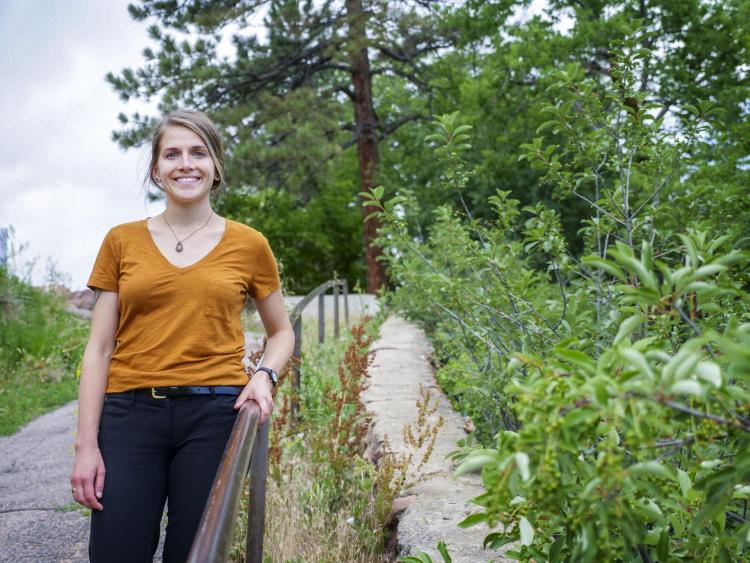Curiosity about the natural world leads to career path in earth science research

Adams has been curious about the natural world since early childhood. And with parents who have been a big influence, it’s not surprising that Adams is following a career path in earth science research.
Since 2018, Adams has been working in CU Boulder’s Research and Innovation Office (RIO) as a research development coordinator for funding and awards. She will leave that position in July to pursue a doctorate in geography and ecohydrology. U.S. News & World Report recently ranked CU Boulder No. 1 in the world in geosciences.
“I’ve been interested in environmental science for years,” Adams said. “I’m interested in looking at how water interacts with vegetation in mountainous areas, where vegetation grows, why it’s there and how it might change in the future. Vegetation affects water resources and provides habitat for animals, so if the vegetation changes because of climate change, it may change how those ecosystems function. Can the data we collect in a single catchment allow us to better understand what is happening on a broader scale? This could help us understand the impacts of climate change on water and forest resources in the future.”
After receiving a bachelor’s degree in physical geography from Western Washington University in 2012, Adams earned a master’s degree in physical geography and ecohydrology from CU Boulder in 2014.
While working on her PhD, Adams will rejoin the CU Ecohydrology Research Group, led by her mentor Holly Barnard, associate professor of geography and an Institute of Arctic and Alpine Research (INSTAAR) fellow. Adams had also worked with this group while she was earning her master’s.
“As an advisor and a mentor, it’s a delight to see a student recognized for their achievements and their potential. Hallie embodies the spirit of rigorous research coupled with community outreach and education. We’re one of the top-ranked programs in geosciences. Hallie will be a member of INSTARR, which offers interdisciplinary training across environmental sciences and geosciences." - Holly Barnard, associate professor of geography; Fellow of INSTAAR
Researchers in the CU Ecohydrology Research Group investigate how vegetation processes affect water flow dynamics and pathways in soil and streams, and how water flow-paths affect vegetation in mountain terrain.
With her doctorate, Adams will delve deeper into answering such questions as: Why does vegetation grow in some locations but not others? With climate changes underway, what will happen to the patterns and functions of vegetation and water in those areas? Will some trees disappear or will they start growing differently or in new places? And what does that mean for water and forest resources?
The level of expertise at CU in earth sciences disciplines, including geography, environmental studies and ecology drew her back to CU.
“I’ve had exceptional teachers and mentors along the way who engaged and encouraged me,” she said. “We have a high level of expertise at CU in earth sciences disciplines and environmental research, and to be able to go back and work with these researchers again is exciting.”
Before working at RIO, Adams worked for the city of Fort Collins Utilities as a science education coordinator, developing educational and outreach programs on climate, water and energy. In Bend, Oregon, she worked as a community and economic development program coordinator with Central Oregon Intergovernmental Council.
Her interest in the community aspect of science and science education has led her to teach classes and workshops in a variety of earth science topics to age groups that span kindergarteners to adults.
Adams is one of 32 CU Boulder graduate students to receive a Graduate Research Fellowship Program (GRFP) award from the National Science Foundation (NSF) this year, paving the way for her to continue innovative research on campus.The GRFP provides three years of support for the graduate education of students who have demonstrated their potential for significant research in STEM education—science, technology, engineering and math.
“I feel fortunate to have been awarded this fellowship as it will be a huge help in growing and bolstering my success as a researcher,” she said. “It provides stability and creative freedom in pursuing and executing my research goals. And it provides the opportunity to apply to other NSF GRFP-specific funding programs, which provide support to conduct research internationally and to participate in internships with federal agencies. This would be really helpful in establishing broader professional networks and collaborations.”


